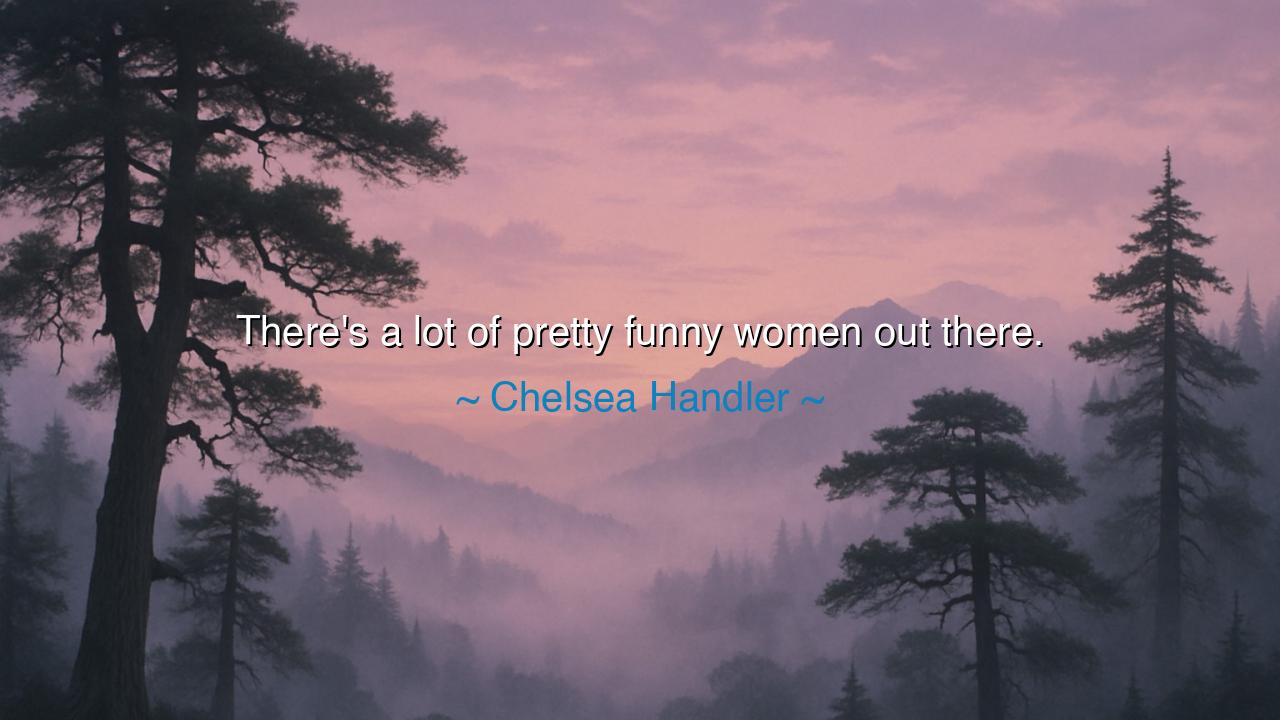
There's a lot of pretty funny women out there.






Hear, O seekers of laughter and truth, the voice of Chelsea Handler, the bold and unflinching spirit of comedy, who once said: “There’s a lot of pretty funny women out there.” Though her words seem simple, they ring like a challenge across the ages—a defiance of silence, a celebration of voice. In this brief declaration lies the power of recognition, the courage to speak of what the world has too long ignored: that humor, like genius, knows no gender; that wit, like fire, burns where it will. Her words are not boastful—they are awakening. They are the sound of one woman standing among many, declaring that the laughter of women is not new, but newly heard.
For centuries, the realm of comedy—the art of mirth, of truth wrapped in laughter—was guarded by the voices of men. Women were cast as muses, not makers; as subjects of jokes, not tellers of them. Yet the power to find humor in pain, to wield laughter as weapon and shield, has always been a gift carried deeply within the feminine soul. From the hearths of ancient villages to the stages of modern cities, women have whispered, laughed, and mocked the absurdities of the world, even when the world refused to listen. Handler’s words, then, are not an announcement of discovery—they are a reclamation of legacy.
Consider the tale of Artemisia of Caria, a ruler and warrior of ancient Greece. When the great king Xerxes asked her counsel before a naval battle, she gave it with wit and cunning. Though the men around her dismissed her words with laughter, it was she who foresaw their defeat. Later, when her warning proved true, that same laughter turned to awe. So it is with women in comedy: long have they spoken truth through laughter, only to have their wisdom overlooked—until the laughter they inspired could no longer be denied. Handler’s statement honors this lineage, acknowledging that funny women are not rare—they are simply unrecognized until courage makes them visible.
There is also humility in her words, for she speaks not of herself alone, but of a sisterhood of humor—of countless women who have found the sacred art of making others laugh even in the midst of struggle. Humor, after all, is not born from ease, but from resilience. It grows in the soil of adversity, in the tension between joy and sorrow. Women have long known how to balance this tension: how to find light in the dark, and to turn that light into laughter. Handler’s acknowledgment of “pretty funny women” is not mere praise—it is reverence for a shared power, a collective flame that illuminates and heals.
And yet, her statement carries a quiet rebellion. For beneath its playfulness lies a truth about the undervaluing of women’s voices. To say “there’s a lot of funny women out there” is also to say, “there have always been, though few cared to see.” Handler, known for her sharp tongue and fearless humor, speaks as one who carved her place in a field that often doubted her right to stand there. Her laughter, like a lion’s roar, challenges the walls of expectation. She reminds us that the laughter of women is not a novelty—it is a force of nature, long suppressed, now unstoppable.
The ancients understood laughter as a divine act. The philosopher Democritus was called “the laughing philosopher” because he saw wisdom in joy. Yet even he knew that laughter is most profound when it comes from those who have suffered much and endured. In that sense, the funny woman is a philosopher, a truth-teller. She laughs not because life is easy, but because she has learned to transform its weight into lightness. In every joke, there is defiance; in every smile, endurance. Handler’s words, then, are not only about humor—they are about survival, transformation, and the divine strength to turn pain into joy.
Therefore, my children of courage and creation, take this teaching to heart: celebrate and uplift the laughter of women, for it is not mere entertainment—it is revelation. Listen when they speak, laugh when they lead you to laughter, and understand that behind their humor lies wisdom shaped by struggle. If you are a woman with a voice, do not dim it; if you are one who listens, do so with respect. For the world grows brighter when more voices join in laughter, and laughter itself grows richer when born from many hearts.
And so remember Chelsea Handler’s words not as a quip, but as a prophecy: “There’s a lot of pretty funny women out there.” Indeed, there are—and they are rising, as they always were meant to, to remind us that laughter, like truth, belongs to everyone. Let it be known across generations that the voice of a woman who makes others laugh is the voice of life itself—irreverent, fearless, and free.






AAdministratorAdministrator
Welcome, honored guests. Please leave a comment, we will respond soon